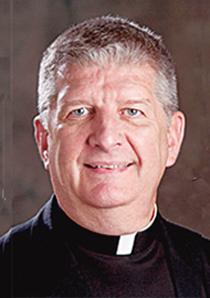
Faith
While the celebration of anointing must be done by a bishop or priest, all members of the Roman Catholic community can and may have ministries toward the sick, elderly, or dying.

O'Grady
The pastor of my first assignment gave me several pieces of sound advice. One of them was, "If you get called for an emergency or an anointing, no matter the time of day or night, go." We had a hospital, and there were more than a few late-night or very early-morning calls. We also had several nursing homes and elderly housing facilities, and, of course, private homes. He was right. First, you went because that's what we do. Next, the family, more often than not present, will never forget your presence. They'll also never forgive your absence.
Most of the time, the call went something like this: "Father, my mother is dying. Can you give her the last rites?" And the calls still come like that.
The caller is asking for a set of rites for the dying person: penance, if needed and the person is able; the Anointing of the Sick, Viaticum (Holy Communion for the last journey); and the Apostolic Blessing. The presence of family, facility staff (Catholic or not), and perhaps neighbors or friends adds to the communal celebration of anointing, as well as demonstrating human support for the aged, sick, or dying person.
The present edition of the liturgical book published for the USA in 1983 contains the Sacrament of the Anointing of the Sick (previously called Extreme Unction or Last Anointing) and is titled "Pastoral Care of the Sick: Rites of Anointing and Viaticum." There is a revision of this book in progress, and it may be printed and replace the current version within 18 months or so. Texts from other liturgical books related to anointing are also included in this volume. Examples are Commendation of the Dying, Prayers for the Dead, and Communion of the Sick. The revision will contain improved translations of the prayers and more biblical selections, but it will, for the most part, keep the present table of contents.
Before turning to the proper texts, all those concerned with the pastoral care of the sick should be familiar with the excellent theology of this sacrament in Pope St. Paul VI's Apostolic Constitution implementing the reformed liturgy and the introduction, which contains both pastoral advice as well as liturgical directives.
Notable changes from the previous rite include a new prayer formula accompanying the anointing first of the hands, then of the head of the person. The tone of the prayers emphasizes the care of God in Christ, extended to the sick through this sacrament.
The preference for at least an occasional public and communal celebration of this sacrament is also new. Many parishes indeed have such celebrations varying from several times a year to perhaps monthly.
A careful reading of the introduction also includes directions for those who can be anointed -- the seriously ill and those of advanced age. Also in this section is a reminder that only priests (this means bishops and presbyters) can anoint the sick.
Questions are commonly raised about the minister of this sacrament, and the consistent response from the Holy See is that because this sacrament is related to the ministry of reconciliation (i.e., penance), only bishops and priests can minister this sacrament. However, this wonderful book has multiple rites that can be celebrated by deacons, lay ministers, or family members.
While the celebration of anointing must be done by a bishop or priest, all members of the Roman Catholic community can and may have ministries toward the sick, elderly, or dying.
Another feature of the current and future revision is regards the holy oil to be used in the celebration of this sacrament.
At the Chrism Mass celebrated near the end of Lent each year in each cathedral, the diocesan bishop blesses the oil of the catechumens, the oil of the sick, and consecrates the sacred chrism. These oils are distributed to the parishes of each diocese and, in the case of the oil of the sick, also to health care facilities.
The obvious preference is to use this oil throughout the diocese all year long. However, a new feature, well now 40 years old, is that oil of the sick may be blessed by the priest during the celebration of the anointing, but not apart from the celebration itself.
Through the renewed sacrament of the anointing of the sick, Christ extends to our own time and until he comes again his healing ministry, his concern for the sick, and for the loved ones also affected by the pain and suffering of a relative or friend.
Recent articles in the Faith & Family section
-
The Christmas crecheFather Robert M. O'Grady
-
Feeling like ChristmasJaymie Stuart Wolfe
-
Parish priests and their peopleMsgr. Frank Kelley
-
Be the carolArchbishop Richard G. Henning
-
Give a Christmas Gift to the MissionsMaureen Crowley Heil


















